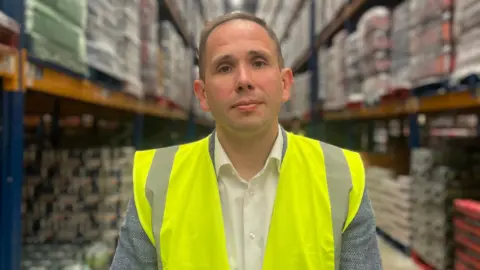### No Respite for Consumers as Food Prices Remain “Stubbornly High”
In Northern Ireland, consumers face an enduring challenge as food prices continue to escalate, with recent reports indicating that there will be no immediate relief in sight. According to a statement from a leading grocery chain, the Henderson Group, food and drink prices have surged by 4.5% over the last year ending in June. This trend marks the highest inflation rate since February 2024, even though it is lower than the peaks witnessed earlier in 2023.
The Henderson Group, which was founded in 1897 and is known for its retail chains like Spar and Vivo, has evolved over the years to encompass various sectors including wholesale and food service, employing nearly 6,000 personnel throughout Northern Ireland. Neil Gamble, the Chief Financial Officer of the group, emphasized that the current economic situation offers no breather to consumers. He characterized the market landscape as “a tough environment,” where rising food prices are expected to persist, possibly reaching as high as 5% by year’s end.
### Changing Shopping Patterns
Mr. Gamble observed that the ongoing inflation in food prices is altering consumer behavior across Northern Ireland. Shoppers are reportedly making fewer visits to stores, opting to buy more during each trip. “The consumer is visiting the store less often but buying more,” he remarked, pointing out that this change reflects a more cost-conscious and environmentally aware shopping trend amid an intensifying cost-of-living crisis.
### Key Factors Impacting Food Prices
Several global and local challenges are contributing to the rising costs faced by retailers. Mr. Gamble noted that fluctuations in the prices of essential commodities such as cocoa, coffee, and butter have led to visible price increases on store shelves. He stated unequivocally, “Unfortunately for us, food price inflation remains stubbornly high.” Additionally, the financial burdens are compounded by increased wages and government-imposed costs such as national insurance contributions, which have escalated the overall operational expenditures.
### Strategies for Maintaining Competitive Prices
Given the high level of competition within the retail sector, the Henderson Group conducts weekly price reviews, continually investing in both prices and supplier partnerships to navigate this challenging landscape. Mr. Gamble articulated the difficulty of balancing these operational pressures with the need for acceptable profit margins that allow for reinvestment in the business. “We review our prices on a regular basis to ensure we are passing through the right costs to the consumer so they will come into our shop and buy more,” he explained.
### Consumer Sentiment on Rising Food Prices
Many residents in Northern Ireland are voicing their dissatisfaction with the soaring prices. For instance, Pat Marshall, a pensioner, lamented her shopping habits have changed dramatically due to escalating costs. “What used to cost you £10 now costs £12,” she expressed, emphasizing the cumulative impact these increments have on her limited budget.
Student Eve Cottell echoed similar sentiments, stating that budgeting has become increasingly challenging with the rising prices. She now opts for cheaper alternatives whenever possible, reflecting broader trends among students who find it difficult to manage their grocery expenses.
### Conclusion
Overall, the current situation in Northern Ireland concerning food prices illustrates a challenging economic environment for both consumers and retailers. With inflation showing signs of persistence and consumer shopping habits evolving in response to these economic pressures, the outlook remains difficult. The Henderson Group, while hopeful for improvement, continues to grapple with the ramifications of rising costs across its operations, underscoring the complex dynamics at play in today’s grocery market. As individuals and families seek more cost-effective shopping strategies, it is clear that managing finances and making informed purchasing decisions will be increasingly critical.











